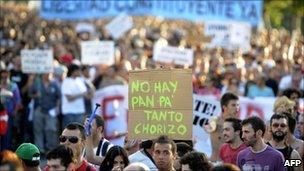IMF says Spain's economy still facing major risks
- Published

Spain has seen a number of large protests against the government's austerity measures
The Spanish economy still faces "considerable" risks, the International Monetary Fund has warned.
In an annual report, the IMF said the Spanish government had to continue work to reduce public spending, and increase efforts to liberalise its jobs market.
Since last year Madrid has been carrying out austerity measures to reduce the country's public deficit.
Unlike other highly indebted eurozone nations such as Greece and Portugal, it has not needed an outside bail-out.
While the IMF did not comment on whether this remained a possibility for Spain, it warned that financial conditions could deteriorate further in the eurozone, which "could put additional pressure on sovereign and bank funding costs for Spain".
As a result, the fund said there could be "no let up in the reform momentum" to both help boost Spain economy and ease the concerns of the financial markets.
It added that Spain's 21% unemployment rate - the highest in Europe - was "unacceptably high".
To help reduce unemployment, the Spanish government is continuing to change the country's labour laws.
Madrid hopes the changes will make firms more willing to take on new staff, because historically it has been difficult for Spanish companies to make staff redundant.
As part of Spain's continuing austerity measures - which have sparked a number of large protests across the country - the government is also reducing the pensions of public sector workers.
Desite the IMF's warnings, it said Spain was still on track to reduce the country's public deficit from 9.2% of its annual economic output in 2010, to 6% this year.